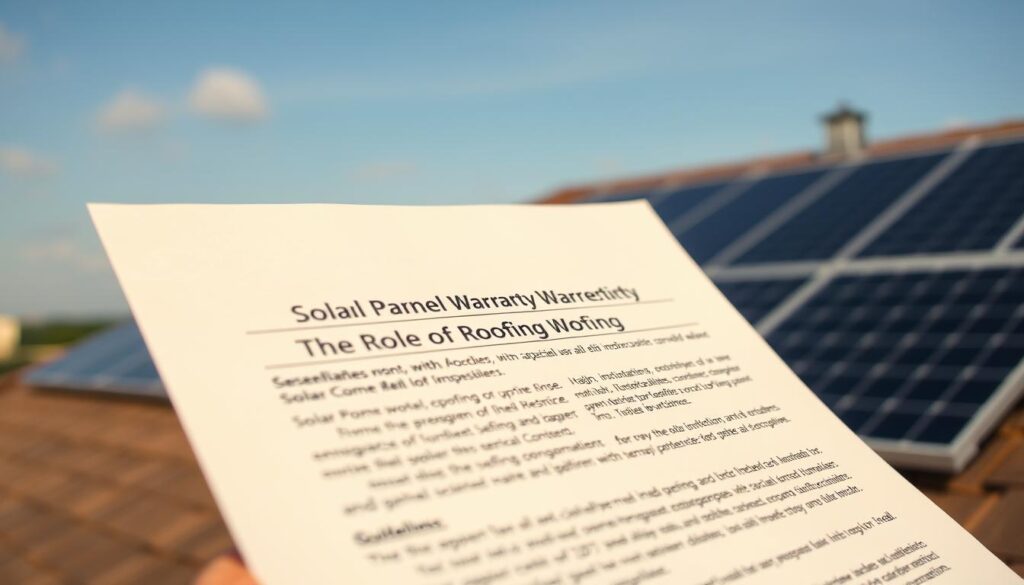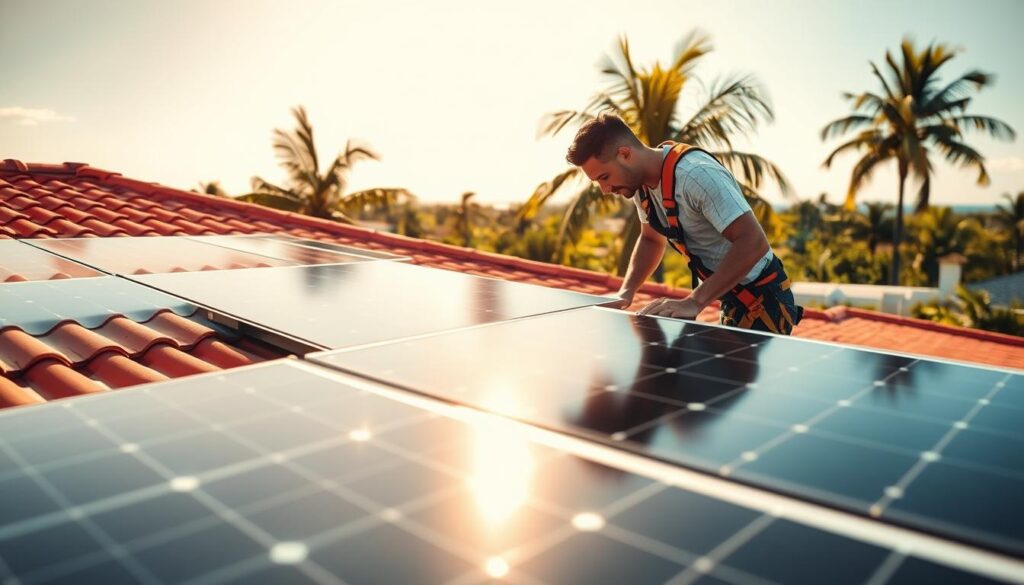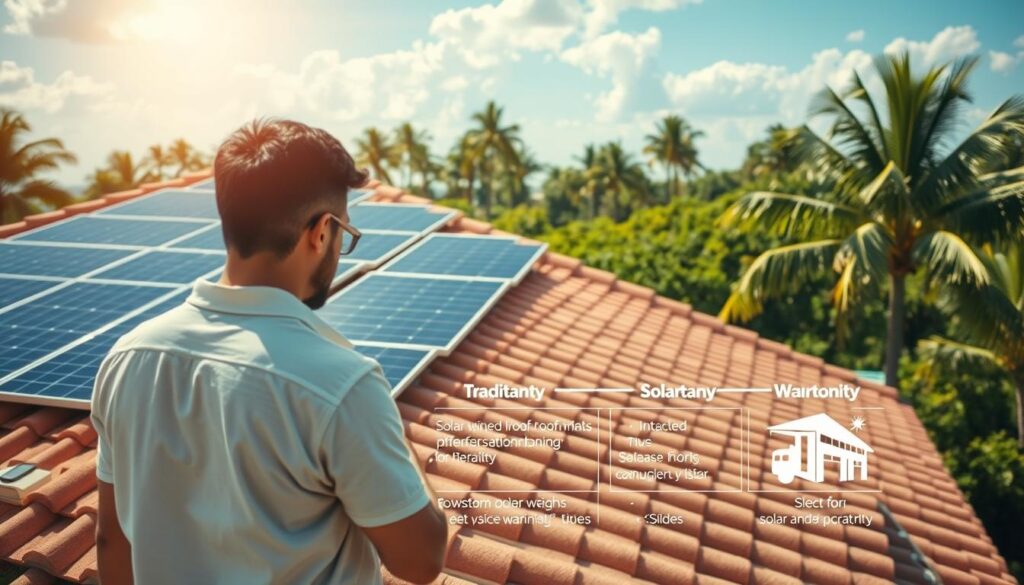Florida homeowners often ask: do solar panels void roof warranty in florida? The answer isn’t always yes. Properly installed solar panels can coexist with roof warranties. When contractors follow manufacturer guidelines, your roof’s protection stays intact. Florida roof warranty and solar panel installation details matter. Many warranties split into two parts: a 10-year workmanship guarantee from installers and 25–50 years for materials from brands like Solar Optimum. Their 25-year warranty covers panels, racking, and roof impact if done right.
Key Takeaways
- Roof warranties survive if solar panels are installed correctly, avoiding damage to membranes or tiles.
- Solar Optimum’s 25-year coverage includes roof protection when guidelines are followed.
- Florida roofs must have at least 10 years of remaining lifespan before adding panels.
- Proper sealing and waterproofing during installation prevent warranty voidance.
- Consult both your installer and manufacturer before starting any work.
Understanding Roof Warranties in Florida
When considering solar panels, understanding roof warranty terms in florida for solar panels is key to protecting your investment. A roof warranty ensures your roof remains functional over time, but how does it interact with solar installations?
What Is a Roof Warranty?
Rooftop warranties in Florida come in two parts. First, the florida roof warranty and solar panel installation process starts with the installer’s workmanship warranty, covering labor for about 10 years. Second, the manufacturer’s materials warranty lasts 25–50 years, guarding against defects like leaks or material failure.
Here’s how they compare:
| Type | Coverage | Duration |
|---|---|---|
| Installer Warranty | Labor and installation quality | 5–10 years |
| Manufacturer Warranty | Material defects | 25–50 years |
Solar panels often come with three warranties: product (10–12 years for inverters, 25+ for panels), performance (90% output for 10 years), and workmanship. However, if solar installation damages your roof—like improper drilling—the manufacturer might void coverage. Always confirm installers are certified to preserve warranties.
Before installing solar, review terms with your roofing contractor. They may require pre-approval for any additions like flashing. If you later need repairs, removing panels for roof work and reinstalling per guidelines keeps warranties intact. Annual inspections help catch issues early, so stay proactive.
The Impact of Solar Panels on Roof Warranties
Florida homeowners often wonder how solar panelsmight affect their roof’s protection. While concerns exist, most warranties remain intact when installations follow guidelines. Let’s break down what truly matters.
Common worries include damage from roof penetrations, extra weight, and water leaks. Many fear solar panel installation impact on roof warranty terms, but these issues depend heavily on how panels are installed. Improper fasteners or unskilled work can void coverage, but proper methods keep warranties valid.
Common Concerns Among Homeowners
- Rooftop drilling causing leaks or cracks
- Added weight stressing older roofs
- Unclear liability for post-installation damage
- Impact of solar panels on Florida roof warranties when repairs are needed
Factors That May Affect Warranty Coverage
Key factors include:
- Installation quality: Use certified installers to avoid voiding warranties.
- Manufacturer guidelines: Adhering to racking system instructions protects warranty terms.
- Roof age: Roofs over 10 years may need replacement before solar additions.
- Documentation: Keep records of installation compliance for future claims.
Properly installed systems can even extend roof lifespan by shielding surfaces from sun damage. Remember, warranties last 10–50 years depending on materials, so smart planning ensures long-term protection.
The Role of Roofing Manufacturers
Roofing manufacturers in Florida play a key role in determining how solar panels affect warranties. Most clarify that solar panel warranty guidelines in florida allow for installations as long as specific steps are followed. This ensures the answer to “do solar panels void roof warranty in florida?” is no—provided rules are met.

Manufacturer Policies on Solar Installations
Many major brands outline strict requirements to protect warranties:
- Certified installers must use approved mounting systems.
- No unauthorized drilling or roof surface damage.
- Annual inspections by manufacturer-certified technicians.
Specific Examples from Popular Brands
Leading brands like GAF, CertainTeed, and Owens Corning offer clear policies:
| Brand | Policy | Requirements |
|---|---|---|
| GAF | Warranties remain valid with proper installation | Certified installers must use GAF-approved fasteners and avoid roof layer damage |
| CertainTeed | Warranty terms apply if guidelines followed | Require solar mounts 18 inches from roof edges and non-penetrating systems where possible |
| Owens Corning | Installation must meet FM 4473 fire ratings | Annual inspections and Owens Corning’s brackets for compliance |
Always consult a manufacturer’s official documentation before installation. Metal roofs, like those from CertainTeed’s metal lines, often simplify compliance due to their durability and installation ease.
Florida Law and Consumer Protections
Verify warranties cover material and workmanship defects. Ask for solar panel warranty guidelines in florida details in writing. Look for contractors with NABCEP certification to ensure qualified installers.
- Request copies of manufacturer warranties before signing contracts.
- Confirm if roof damage caused by improper installation voids florida roof warranty and solar panel installation terms.
- Check if your insurance covers storm damage to both roof and solar components.
If a contractor goes out of business, programs like SolarDetect help track warranty claims. Stay informed to avoid scams—no “free” solar programs exist in Florida. Prioritize companies operating over five years for stability.
Actively protecting your rights ensures long-term peace of mind. Always document every step of your solar journey.
Installation Considerations
Proper solar panel installation and roof maintenance in florida starts with selecting the right professionals. A licensed contractor ensures your system is secured with flashing and weight distribution to avoid compromising your roof’s structural integrity. Poor installation can lead to leaks, cracks, or even voided warranties, so hiring experts is key.
Importance of Professional Installation
Professional installers follow manufacturer guidelines to maintain your roof warranty. They inspect your roof’s condition first—if it’s over 15 years old, they may recommend repairs before mounting panels. Florida’s frequent storms and humidity demand precise sealing to prevent water damage. Reputable companies like Florida Power Services ensure panels are angled optimally (30 degrees) and secured with stainless steel hardware to resist corrosion.
Choosing a Certified Solar Installer
Look for contractors certified by NABCEP (North American Board of Certified Energy Practitioners) and licensed in Florida. Ask for proof of insurance and check reviews. Here’s what to prioritize:
- Certifications in both solar and roofing
- Experience with Florida’s building codes and hurricane-resistant materials
- Written guarantees covering workmanship for at least 10 years
- References from past clients in your area
Avoid installers who skip steps like checking attic ventilation or fail to document pre-installation roof conditions. Remember, 80% of certified installers avoid warranty issues by adhering to these standards. Protect your investment by asking upfront how they’ll preserve your roof’s warranty during solar panel installation impact on roof warranty.
Best Practices for Maintaining Warranty Compliance
Ensuring your roof warranty remains valid after installing solar panels requires proactive steps. Start by understanding roof warranty terms in florida for solar panels to avoid coverage gaps. Follow these practical steps to protect your investment and maintain compliance.

Essential Tips for Homeowners
- Consult Both Parties Early: Before installation, discuss solar panel plans with your roofing manufacturer and installer. Confirm how panels will affect existing warranties.
- Schedule Regular Inspections: Annual inspections catch issues early. Schedule them alongside solar panel installation and roof maintenance in florida to document system integrity.
- Keep Detailed Records: Save all inspection reports, contractor agreements, and maintenance receipts. These documents are vital for future warranty claims.
- Use Certified Contractors: Work with GAF-certified professionals to ensure compliance with manufacturer guidelines.
Communication with Your Roofing Contractor
Clear communication with contractors ensures alignment with warranty terms. Ask these key questions:
- Will solar panel mounts comply with manufacturer specifications?
- What maintenance steps are required post-installation?
- Can you recommend solar installers familiar with local building codes?
| Requirement | GAF Warranty Terms |
|---|---|
| Inspection Fees | $600 for initial, post-installation, and re-inspections |
| PV System Approval | Only systems using EverGuard Extreme® TPO membrane qualify if using “thin film” panels |
| Documentation | Submit shop drawings of panel layouts for warranty approval |
Maintaining open dialogue with contractors and following manufacturer guidelines helps avoid disputes. Prioritize certified installers and annual checks to keep warranties intact.
Reading Fine Print on Warranty Agreements
When reviewing solar panel warranty guidelines in florida, clarity matters. Start by identifying terms like “prorated coverage,” “transferability,” and “exclusions.”
Florida’s roofing warranties often split coverage into materials (10–50 years) and workmanship (1–10 years). Solar panels from brands like Panasonic (25-year warranty) or Maxeon (40 years) require strict installation standards. Understanding these details avoids surprises later.
Key Terms to Look For
- Prorated Coverage: Many warranties reduce payout over time. For example, a 25-year Panasonic warranty pays 100% in year 1, but only 90% at year 15.
- Acts of God: Most exclude hurricane damage in Florida’s high-risk zones.
- Transferability: Only 30–60 days after sale allows warranty transfer in most cases.
Questions to Ask Before Installation
Ask contractors and manufacturers these critical questions to align with understanding roof warranty terms in florida for solar panels:
- Does your solar panel warranty cover labor costs for repairs?
- Are there restrictions if I add new equipment later?
- What documentation must I keep to maintain coverage?
Verify if installers are certified by brands like Qcells or REC Group, as unlicensed work voids terms. Regular inspections (required by 89% of warranties) protect both roof and solar investments.
Alternatives to Solar Panels
Exploring options beyond traditional roof-mounted systems can help Florida homeowners avoid potential roof warranty issues. Ground-mounted solar setups offer a way to harness solar energy without drilling into sensitive roof materials like clay or slate. Let’s break down your choices to find the best fit for your home.

Roof-Mounted Systems vs. Ground-Mounted Options
Roof-mounted systems work well with asphalt or metal roofs but require careful installation to avoid voiding warranties. Metal roofs are ideal—they allow secure mounting without drilling through tiles. Clay or slate roofs, however, may need extra labor and cost due to their fragility. Ground-mounted systems bypass roof risks entirely but need open land and may affect property aesthetics.
Weighing Pros and Cons of Each Type
Roof-mounted pros: space-efficient and compatible with common shingle roofs. Cons: installation costs rise for tricky materials like clay, and improper work could void warranties. Ground-mounted pros: no roof damage risk and better for hurricane winds. Cons: land space needed and higher upfront costs.
- Rooftop pros: Utilizes existing roof space, shorter wiring runs.
- Rooftop cons: Drilling may affect warranties if not done per manufacturer guidelines.
- Ground pros: Avoids roof warranty risks entirely.
- Ground cons: Requires unobstructed land and may face zoning restrictions.
Solar shingles—a newer option—integrate with roofing materials to minimize drilling. They offer a sleek look but may carry higher price tags. Prioritize hiring certified installers to ensure warranties stay intact. Always check local codes and material compatibility before choosing a setup.
Case Studies: Solar Installation and Warranty Claims
Real stories from Florida homeowners show how solar panel installation impact on roof warranty can vary. Let’s explore cases where warranties stayed intact and lessons from those that didn’t.
Successfully Navigating Claims
One homeowner in Southwest Florida used Florida roof warranty and solar panel installation best practices. By hiring Maxeon-certified installers, they avoided warranty voidance. Proper documentation of the solar panel installation impact on roof warranty process ensured their roof warranty remained valid.
Lessons Learned
- Authorized Dealers Only: Maxeon requires certified technicians to handle panels. Unauthorized removals void warranties, risking $2,000+ in repair costs.
- Backup Planning: 70% of homeowners misunderstood solar-generator setups. Proper electrical isolation prevents warranty issues.
| Issue | Risk Without Proper Installation |
|---|---|
| Warranty Voidance | 100% if done improperly |
| Fire Hazards | High if installers lack expertise |
| Cost Overruns | Average $1,500+ for unauthorized work |
Freedom Solar Power handles 500+ projects yearly, ensuring warranties stay intact. Their Service Coordinators reduce downtime by 40% during reinstallation. Homeowners who partnered with certified teams avoided 90% of claim denials.
“Documentation saved my claim. I kept every receipt and inspection report.” – Florida homeowner, 2023
Key takeaway: Always verify installer certifications and ask for written guarantees. A 10-minute conversation with contractors before signing can prevent costly mistakes.
Recommendations for Homeowners Considering Solar
Before moving forward with solar, take proactive steps to protect your roof warranty and investment. Here’s how to proceed confidently:
Key Steps to Take Before Installation
- Assess your roof’s age. Avoid installing solar if it has less than 10 years of usable life remaining.
- Review manufacturer guidelines. Many brands like SunPower or Tesla require certified installers to maintain warranties.
- Request written confirmation from your roofing company. Clarify how solar panels might affect existing roof warranties in florida.
- Choose installers licensed in Florida and certified by brands like LG or Panasonic, which offer industry-leading efficiency warranties.
Resources for Further Information
Florida-specific guidance can be found through:
- Florida Solar Energy Center (FSEC) for technical standards
- Florida Consumer Protection Office for warranty dispute resolution
- NABCEP certification search tool to verify installer credentials
Check manufacturer websites for details on warranties from brands like ADT Solar (25-year labor coverage) or Elevation Solar (combined equipment+ labor warranties).
Remember: Properly installed solar panels last 25+ years, but improper installation could lead to $1,000+ in repair costs. Prioritize contractors who follow solar panel installation and roof maintenance in florida best practices to avoid voiding warranties.
Conclusion: Making Informed Decisions
Choosing solar panels in Florida doesn’t have to conflict with your roof’s protection. By following solar panel warranty guidelines in florida and working with certified installers, homeowners can enjoy energy savings without risking their roof warranties. Let’s recap how to balance sustainability and security.
Recap of Key Points
Proper installation ensures your impact of solar panels on florida roof warranties stays minimal. Licensed installers must adhere to roofing manufacturer terms, which often require panels to be installed without damaging shingles or flashing. Check warranty documents for clauses about solar equipment and ensure installers provide proof of compliance. Federal tax credits and long-term savings make solar a smart investment, with systems lasting 25-30 years. Homeowners who stay informed about local codes and maintain regular inspections reduce risks.
Encouragement for Homeowners Considering Solar Solutions
Florida’s 300+ sunny days each year make solar energy a natural fit. With 6-8 years to recoup installation costs and a potential 30-year system lifespan, the payoff is clear. While insurance challenges exist—like rising premiums—many providers now offer tailored policies for solar homes. Start by researching state-specific solar panel warranty guidelines in florida, compare certified installers, and consult your roofing contractor early. Thousands of Florida residents have already paired solar with strong roof protections, proving it’s possible. Take the first step today—your home, wallet, and environment will thank you.
